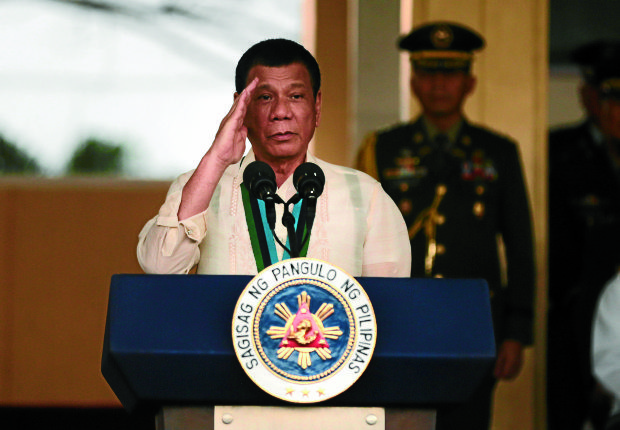Duterte kills were ‘legit,’ says Palace

President Rodrigo Duterte salutes the troops during the 81st anniversary of the Armed Forces at Camp Aguinaldo on Wednesday, December 21, 2016. INQUIRER PHOTO / GRIG C. MONTEGRANDE
President Rodrigo Duterte’s killing people when he was mayor of Davao City was part of “legitimate police action” and had already been investigated, Malacañang said on Wednesday following a call from the United Nations human rights chief to investigate Mr. Duterte for murder.
UN High Commissioner for Human Rights Zeid Ra’ad Al Hussein issued a statement on Tuesday urging Philippine authorities to “demonstrate their commitment to upholding the rule of law and their independence from the executive by launching a murder investigation.”
Setting example
Mr. Duterte said last week that when he was mayor of Davao City, where he served three terms between 1988 and 2016, he patrolled the streets on a big motorbike and “personally killed” people to set an example for police.
He made the comments in a speech to businessmen in Malacañang as he discussed his brutal war on drugs, which has seen police and unknown assailants kill about 6,000 people since he became President on June 30.
Article continues after this advertisement“The killings committed by Mr. Duterte, by his own admission, at a time when he was a mayor, clearly constitute murder,” Zeid said.
Article continues after this advertisementAsked by reporters on Wednesday what action the government would take, presidential spokesperson Ernesto Abella said the killings referred to by Mr. Duterte were part of “legitimate police action.”
“Let me just remind one and all, that the incident referred to by the President was actually already covered by [the] media and it was legitimate police action and that the UN commissioner is free to express his views regarding that matter,” Abella said.
“It’s already been under scrutiny in the past, but it has already been addressed as far as we know,” he added.
Abella also said Zeid’s comments were nothing more than “his opinion.”
Presidential Communications Secretary Martin Andanar, speaking in a radio interview, said Mr. Duterte had been investigated when he was mayor and no evidence had been found linking him to extrajudicial killings in Davao.
“Sen. [Leila] de Lima herself said that when she was still chairman of the Commission on Human Rights (CHR),” Andanar said.
He was referring to the CHR investigation of extrajudicial killings in Davao in 2009.
Andanar said that while Zeid had a duty to look into human rights violations, he should follow “proper protocol” instead of just relying on news reports.
“[T]he proper protocol is to go through the Department of Foreign Affairs, they could ask questions,” he said.
PH legal system
Senate President Aquilino Pimentel III and Sen. Panfilo Lacson said Zeid was apparently not knowledgeable about the Philippine legal system.
“Forgive them for they do not know our internal procedures and processes here,” Pimentel said in a text message.
“[O]ur President enjoys immunity from suit during his term,” Lacson said, also in a text message. “[N]o matter how many times a person in our country admits having committed murder, as long as there is no other evidence to corroborate his extrajudicial confession, the case cannot stand in any court of law.”
Senate Majority Leader Vicente Sotto III asked why Zeid was urging an investigation only now when Mr. Duterte had been talking about the Davao killings since the campaign for May’s presidential election.
Mr. Duterte’s chief legal counsel, Salvador Panelo, said in a radio interview that the only use for any investigation of Mr. Duterte for murder was to destroy his name.
He said that as President, Mr. Duterte is immune from suit.
Panelo said Mr. Duterte’s critics were people who did not clearly understand what the President was saying.
UN rapporteur inquiry
Zeid’s call for an investigation of Mr. Duterte comes as the UN special rapporteur on extrajudicial killings is grappling with the government over the terms of her proposed inquiry into the killings of thousands of drug suspects in the Philippines.
The government has invited special rapporteur Agnes Callamard to look into the killings, but Mr. Duterte has set conditions for the inquiry, including a public debate in which Callamard would be under oath and where he could question her on the “authenticity” of her findings. —WITH REPORTS FROM CHRISTINE O. AVENDAÑO AND AFP